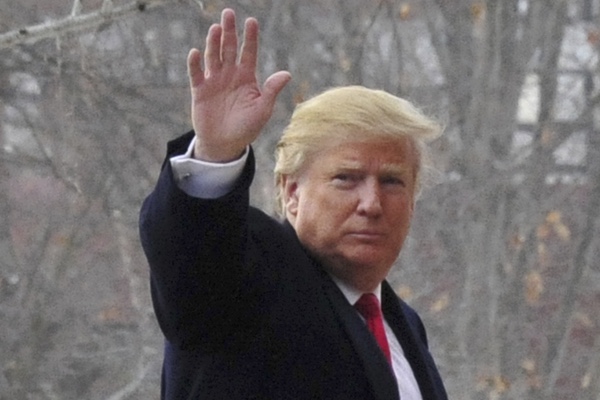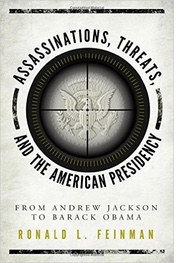Is Donald Trump the Most Dangerous Presidential Candidate in American History?

Debate is widespread that Donald Trump is the most dangerous Presidential candidate in American history. Is that a valid belief? It requires examination of other Presidential candidates who were seen in their time as “dangerous,” in addition to those candidates running alongside Trump for President in 2016.
 Louisiana
Governor and Senator Huey P. Long was seen as a demagogue in the
early 1930s, surrounded by state troopers dressed in such a manner
that many observers compared them to Fascist Black Shirts in Italy
under Benito Mussolini. He projected a populist appeal – including
socialist concepts like Share the Wealth and Every Man a King –
although Socialist Party leader Norman Thomas claimed Long was a fake
socialist. Long also had an appeal that came across to many people
as being overtly Fascist, such as Mussolini; some even compared him
to Adolf Hitler. He was perceived as a threat to President Franklin
D. Roosevelt in 1936, and gathered around himself a lot of fringe
elements, including Father Charles Coughlin (the Radio Priest), and
Gerald L. K. Smith (the anti-Semitic minister), both of whom promoted
Fascism and anti-Semitism. He had a powerful radio voice and
millions found him appealing. He was the first political media star,
and drew loyalty from people who believed he would give America an
economic lift greater than FDR’s New Deal. The outpouring of
sentiment after his assassination in September 1935, including
tremendous crowds at his funeral in Baton Rouge, was also met by
sighs of relief that this man, who seemed a menace to stability and
order in the country, had been removed as a threat, although the
belief was that he had no realistic chance to be elected President in
either 1936, or long range in 1940.
Louisiana
Governor and Senator Huey P. Long was seen as a demagogue in the
early 1930s, surrounded by state troopers dressed in such a manner
that many observers compared them to Fascist Black Shirts in Italy
under Benito Mussolini. He projected a populist appeal – including
socialist concepts like Share the Wealth and Every Man a King –
although Socialist Party leader Norman Thomas claimed Long was a fake
socialist. Long also had an appeal that came across to many people
as being overtly Fascist, such as Mussolini; some even compared him
to Adolf Hitler. He was perceived as a threat to President Franklin
D. Roosevelt in 1936, and gathered around himself a lot of fringe
elements, including Father Charles Coughlin (the Radio Priest), and
Gerald L. K. Smith (the anti-Semitic minister), both of whom promoted
Fascism and anti-Semitism. He had a powerful radio voice and
millions found him appealing. He was the first political media star,
and drew loyalty from people who believed he would give America an
economic lift greater than FDR’s New Deal. The outpouring of
sentiment after his assassination in September 1935, including
tremendous crowds at his funeral in Baton Rouge, was also met by
sighs of relief that this man, who seemed a menace to stability and
order in the country, had been removed as a threat, although the
belief was that he had no realistic chance to be elected President in
either 1936, or long range in 1940.
J. Strom Thurmond, Governor of South Carolina, when he ran for President in 1948 on the States Rights Party ballot line (also known as the Dixiecrats), and later long term Senator until age 100, first a Democrat and then a Republican, was perceived as a danger to racial harmony, when he decided to challenge President Harry Truman, over the issue of the President’s executive order integrating the nation’s military. The fact that he was able to win 39 electoral votes and four Southern States was alarming, as at the time, it was the second best third-party performance ever, behind Theodore Roosevelt’s Progressive (Bull Moose) Party in 1912, which gained 88 electoral votes and six states across the nation. But at least with Thurmond, it was clearly understood that he was fighting against the tide, and would never have a realistic chance to be elected President, although the promotion of racial hate and division was certainly troubling,
Arizona Republican Senator Barry Goldwater fought against the party establishment in the 1964 Presidential election cycle, and became feared as a right-wing extremist, wishing to repeal the New Deal programs of FDR, and advocating confrontation with Communism in a much more direct manner than the policy of containment, in effect since President Truman’s time. He was seen as reckless in his oratory, and the effect of his candidacy was to divide the Republican Party, creating a split unseen since 1912 when TR had challenged President William Howard Taft. Goldwater was seen as alienating the political center, and many Republican office holders repudiated him, including rival New York Governor Nelson Rockefeller. Goldwater lost in a massive landslide, giving President Lyndon B. Johnson the largest percentage of popular votes, more than 61 percent, that we have ever seen in American history, although Goldwater did win five Southern states and Arizona.
Probably the greatest threat to stability and racial harmony in American history came when Alabama Governor George C. Wallace formed a third party, the American Independent Party, in 1968, and won 46 electoral votes and five Southern states, surpassing Thurmond’s 1948 run for President. Receiving about one out of every seven votes, Wallace divided the nation with his incendiary racial rhetoric and condemnation of anti-Vietnam War protesters. He alarmed many when he chose Retired Air Force General Curtis LeMay as his Vice Presidential running mate, who advocated using nuclear weapons in Vietnam, a shocking suggestion. Four years later, Wallace was shot down and paralyzed for life in May 1972, while seeking again to run for President, and attempting to become the Democratic Presidential nominee.
Patrick J. Buchanan, who served as a staff aide to Presidents Richard Nixon and Ronald Reagan, and also became a media personality on cable and in print with his nativist, racist, and anti-Semitic advocacy, challenged President George H. W. Bush’s re-nomination in 1992, and failing at that, competed for the Republican nomination against eventual nominee Senator Bob Dole of Kansas in 1996. In 2000 he was the Reform Party Presidential candidate. Confusion over the “butterfly ballot” in Palm Beach County, Florida, caused 4,000 Al Gore voters to vote instead for Buchanan, something they would not have done by intention, as most of those 4,000 voters were Jewish. This helped to cause the Florida election debacle, leading to George W. Bush’s election as President.
Now in 2016 Texas Senator Ted Cruz is perceived by many as a very dangerous candidate. Disliked universally by his Senate colleagues, and having gained the reputation of extremism after he tried to shut down the federal government as a self-appointed spokesman for the Tea Party Movement, Cruz has promoted the Christian religion in politics more than anyone else. He has gathered around him extremist right-wing talk show hosts and propagandists who have pushed anti gay, anti women’s rights, anti Islamic goals. He has reminded many of the demagogue Wisconsin Senator Joseph McCarthy, leader of the infamous Red Scare of the 1950s. (It hasn’t helped that Cruz bears a striking physical resemblance). Cruz is seen as one of the two horrible choices that for now are likeliest to win the GOP nomination.
The other is Donald Trump. Trump would be only the second major party Presidential nominee (after Wendell Willkie in 1940) to have absolutely no government experience of any kind, and no service either in the military. He is seen as a “loose cannon” who will say anything reckless that comes out of his mouth, and he has totally uprooted the Republican establishment with his dangerous antagonizing viewpoints, including his advocacy of nativism, racism, misogyny, and Islamophobia. He appeals to the economic insecurity of many of his followers, who wish to blame their plight on other ethnic, racial and religious groups. Millions have been alarmed by his call to build a wall along the Southern border with Mexico; his proposed ban on all Muslim immigration; his suggestion that we don’t need NATO; and his lengthy list of insults against every critic and opponent. On top of all that there’s his backing of birtherism, though we don’t hear much of that now. In recent months he has drawn the support of extremist right-wing groups such as the Ku Klux Klan and Neo-Nazis and won the endorsement of former KKK leader David Duke. Then there’s his encouragement of violence at his political rallies. Uninterested in policy, Trump appeals to his supporters’ emotions. Many see him as a potential Mussolini or Hitler. He is totally unpredictable, and it is hard to know what his limits would be if he were to be elected President. Many foreign governments have already expressed alarm at the possibility that he might win the Presidency in November 2016.
So who is the most dangerous Presidential candidate in American history? Is it Huey P. Long, J. Strom Thurmond, Barry Goldwater, George C. Wallace, Patrick J. Buchanan, Ted Cruz, or Donald Trump?
On balance, it is clearly Donald Trump. For Trump has a following far greater than Long or Thurmond or Wallace or Buchanan, none of whom were able to run on a major party ticket. Trump, with his personality and charisma and fame as a reality star on television, has a greater impact than Goldwater ever could have. Also, Goldwater was competing against a President (Johnson) who had just succeeded an assassinated President (John F. Kennedy). Trump also helps to make Cruz look weak by comparison, and Cruz's personality also undermines his image, although any intelligent observer still would fear a Cruz Presidency. But on balance, Trump is more dangerous because of widespread support among Americans who see him as a hero against the Establishment. He is without a doubt the most dangerous candidate for President in all of American history.